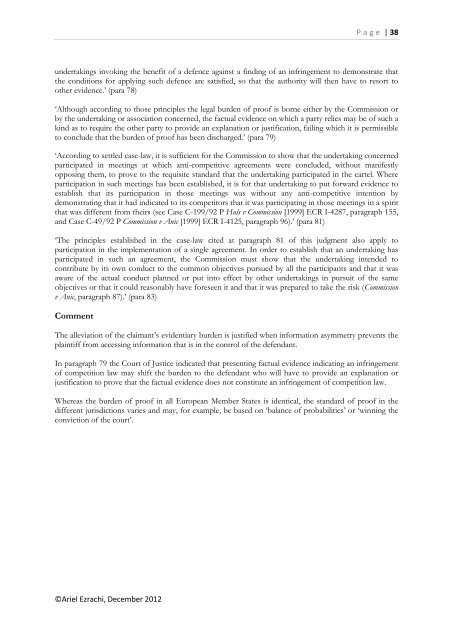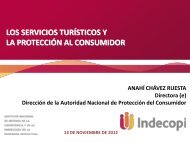EU Competition Law and Policy - compal
EU Competition Law and Policy - compal
EU Competition Law and Policy - compal
Create successful ePaper yourself
Turn your PDF publications into a flip-book with our unique Google optimized e-Paper software.
©Ariel Ezrachi, December 2012<br />
P a g e | 38<br />
undertakings invoking the benefit of a defence against a finding of an infringement to demonstrate that<br />
the conditions for applying such defence are satisfied, so that the authority will then have to resort to<br />
other evidence.’ (para 78)<br />
‘Although according to those principles the legal burden of proof is borne either by the Commission or<br />
by the undertaking or association concerned, the factual evidence on which a party relies may be of such a<br />
kind as to require the other party to provide an explanation or justification, failing which it is permissible<br />
to conclude that the burden of proof has been discharged.’ (para 79)<br />
‘According to settled case-law, it is sufficient for the Commission to show that the undertaking concerned<br />
participated in meetings at which anti-competitive agreements were concluded, without manifestly<br />
opposing them, to prove to the requisite st<strong>and</strong>ard that the undertaking participated in the cartel. Where<br />
participation in such meetings has been established, it is for that undertaking to put forward evidence to<br />
establish that its participation in those meetings was without any anti-competitive intention by<br />
demonstrating that it had indicated to its competitors that it was participating in those meetings in a spirit<br />
that was different from theirs (see Case C-199/92 P Huls v Commission [1999] ECR I-4287, paragraph 155,<br />
<strong>and</strong> Case C-49/92 P Commission v Anic [1999] ECR I-4125, paragraph 96).’ (para 81)<br />
‘The principles established in the case-law cited at paragraph 81 of this judgment also apply to<br />
participation in the implementation of a single agreement. In order to establish that an undertaking has<br />
participated in such an agreement, the Commission must show that the undertaking intended to<br />
contribute by its own conduct to the common objectives pursued by all the participants <strong>and</strong> that it was<br />
aware of the actual conduct planned or put into effect by other undertakings in pursuit of the same<br />
objectives or that it could reasonably have foreseen it <strong>and</strong> that it was prepared to take the risk (Commission<br />
v Anic, paragraph 87).’ (para 83)<br />
Comment<br />
The alleviation of the claimant’s evidentiary burden is justified when information asymmetry prevents the<br />
plaintiff from accessing information that is in the control of the defendant.<br />
In paragraph 79 the Court of Justice indicated that presenting factual evidence indicating an infringement<br />
of competition law may shift the burden to the defendant who will have to provide an explanation or<br />
justification to prove that the factual evidence does not constitute an infringement of competition law.<br />
Whereas the burden of proof in all European Member States is identical, the st<strong>and</strong>ard of proof in the<br />
different jurisdictions varies <strong>and</strong> may, for example, be based on ‘balance of probabilities’ or ‘winning the<br />
conviction of the court’.



